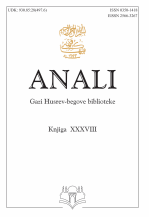ODREĐENOST I NEODREĐENOST U KURʼANU
DEFINITIVES AND INDEFINITIVES IN QUR’AN
Author(s): Mustafa JahićSubject(s): Language and Literature Studies, Theology and Religion, Islam studies, Philology
Published by: Gazi Husrev-begova biblioteka
Keywords: Qur’an; stylistics; grammar; indefinite; definite; noun; subject; predicate;
Summary/Abstract: The paper discusses the categories of definitive and indefinite of subject (musnad ilayhi) and predicate (musnad) viewed from the syntax and semantic aspects in the text of Qur’an. In addition to playing an important role in establishment of correct syntax structures and in understanding of the function of a word in a sentence, definitive and indefinite features also represent a significant stylistic means by which, because of the diversity in their realization, particularly by a definitive one, other specific meanings are obtained, apart from simple stylistic effects. This is why an analysis of the category of definite and indefinite in Qur’an is important for understanding and interpretation of Qur’an. Definitiveness of a subject is achieved by personal pronoun, personal noun, demonstrative pronoun, definite article, construction of annexing and vocative particle yāʼ. However, since it is an information on the subject, a predicate may be even definite if a noun is in the place of a predicate, providing that such a sentence makes sense. In this case, different meanings may be seen. Since the original status of a subject is definite, indefinite noun of a general meaning may be in the place of a subject but only when the context of a sentence, by its meaning, is close to definite noun. Because the original status of a predicate in a noun sentence is indefinite, such a predicate expresses only an information on the subject, which is the basic function of a predicate.
Journal: Anali Gazi Husrev-begove biblioteke
- Issue Year: 2017
- Issue No: 38
- Page Range: 49-75
- Page Count: 27
- Language: Bosnian

